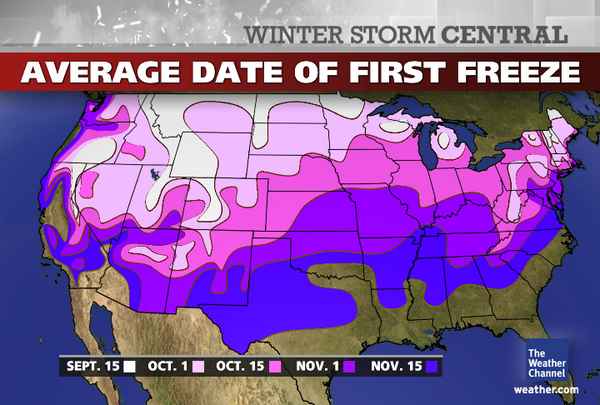When does it freeze where you live? What do you do to be ready for it?

stacey |
Since I am a little bit of a weather junkie, I love to watch the forecasts and weather patterns. I was a little surprised a few minutes ago to get a freeze warning, as our forecasted low tonight is only 37, but we are a little past due for our first freeze of the season here in the Texas Panhandle. Have you had your first freeze where you live? Not sure when yours should hit? This really neat map from The Weather Channel can show you your average first freeze date.
Our pastor Sunday said that we are lucky to live in a region that has actual seasons. I can easily agree with that on a beautiful spring or fall day, but when it's 10 degrees and we have a negative windchill - well, then I have a little more trouble seeing the positive side of things. One thing I can do to ease the pain (and the frostbite!) is to make sure that I am prepared. Before those bitter cold days hit, I have a few things that I like to do.
First up, fall repairs. Sometimes those repair jobs turn into replace or upgrade situations, so it's best to get them done ahead of time. It's a great opportunity to check all of your pens or pastures, including barns, sheds, feed and water troughs, and hoses. You might need de-icers or extension cords. Maybe some extra troughs or hay feeders in case of inclement weather. Check on the shovel or axe you use to break ice. Definitely check on your warm, winter gloves. Make sure you don't have any holes or cracks in them.
I also like to check on my blankets before I need them. Since I have several horses that are still young and growing or filling out, I like to get their blankets out and make sure that they still fit. If you aren't sure on fit or need a new blanket, you can check out our blanket fitting guide. I also take this opportunity to check and adjust straps so that I don't have to attempt that task with frozen fingers in the dark some night.
Deworming your horses is an important winter activity, but this one it's critical not to jump the gun. You want to use a boticide after you have had a good killing freeze when there are no more insects. If you do it too soon, bot flies could still be active and lay more eggs.
What do you do to prepare for the first freeze? We would love for you to leave us a comment here.
